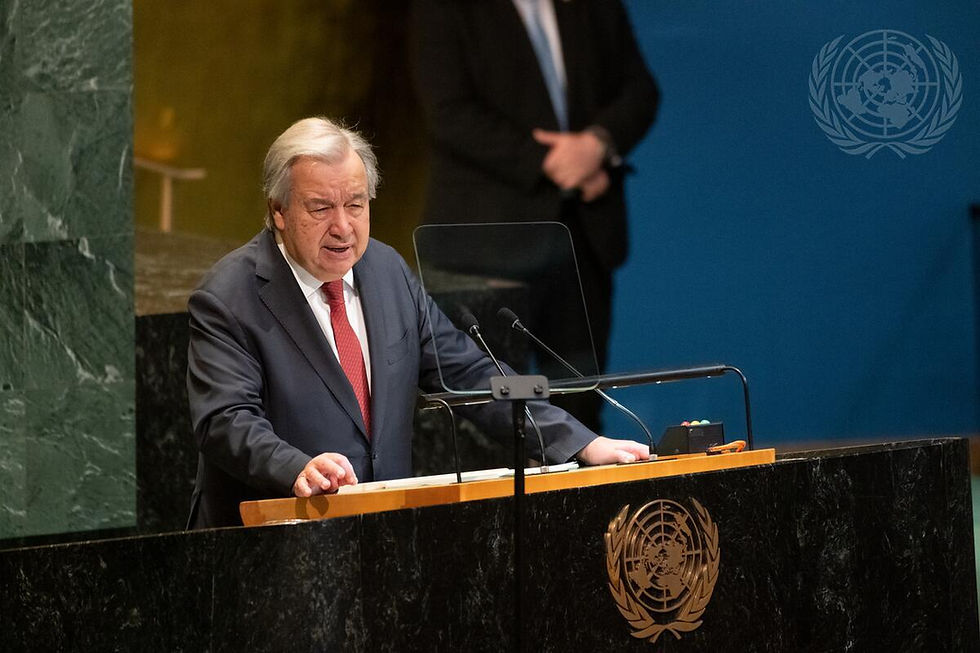Analysis| UN80: Guterres Pushes the Reset Button, But Member States Hold the Remote
- Oct 16, 2025
- 4 min read

By Ahmed Fathi
UNHQ, New York: There was a different energy in the UN General Assembly Hall yesterday — part tension, part exhaustion, part quiet hope. UN Secretary-General António Guterres stepped up to the podium and, in his usual calm but urgent tone, asked Member States to look beyond the bureaucratic fog and face the obvious: the United Nations, as it turns 80 (UN80) , is creaking under its own weight.
“The ultimate direction of the UN80 Initiative rests with you, the Member States,” he told the packed chamber — a sentence that landed like both an invitation and a warning.
The Secretary-General’s Pitch: Cut the Fat, Keep the Soul
Guterres has spent the better part of the year trying to sell what he calls the UN80 Initiative — a three-part plan to make the United Nations “fit for today’s challenges.”

In practical terms, it means a brutal round of belt-tightening and structural surgery. He’s proposing a 15 percent budget cut and a 19 percent reduction in staff posts for 2026 — all while insisting that peace, human rights, and development must remain protected.
“Every dollar must count,” he said, emphasizing that developing nations, especially in Africa and small island states, would not bear the brunt of these cuts.
Workstream 2 — the “mandate review” — aims to declutter the system’s paper trail. Dozens of overlapping reports and mandates would be consolidated. Some would be quietly retired.
But it’s Workstream 3 — structural realignment — that truly shakes the walls. He floated the idea of merging UNDP and UNOPS, possibly UNFPA and UN Women, and creating joint hubs to eliminate redundancy across humanitarian, peace, and development work.
If implemented, it would be the most sweeping reorganization of the UN in decades.
The Backdrop: Donor Fatigue and Existential Anxiety
Guterres didn’t mention it outright, but everyone in the room knew why this reform is being rushed. Donor fatigue is setting in. The U.S. and several major contributors are increasingly skeptical of what they call “UN sprawl” — a system of overlapping agencies with ballooning budgets and diminishing impact.
The Secretary-General is betting that if he can demonstrate efficiency and accountability, he can also rescue faith in multilateralism itself. But many diplomats quietly worry he’s cutting into muscle, not fat.
Inside the UN system, anxiety runs high. Staff unions have warned of “reform by attrition. ”Gender advocates fear that folding UN Women into another entity could silence a vital voice for equality. And development officials whisper that merging agencies might save money but not necessarily lives.
Washington’s View: The United States Wants Reform — On Its Terms
The United States — still the UN’s largest funder — has been both cheerleader and watchdog in this process. American diplomats publicly support the push to streamline mandates and reduce costs.
In a statement released by the U.S. Mission to the UN, Washington said it “welcomes recommendations that strengthen accountability and cut duplication,” a polite nod that echoes long-standing American frustrations with UN inefficiency.
Behind closed doors, however, the tone is more cautious. The U.S. supports consolidation — but only when it doesn’t dilute its own influence or redistribute its funding through pooled mechanisms it can’t control. As one diplomat put it, “Efficiency is great, but accountability means knowing where every dollar goes — and right now, that’s non-negotiable.”
This is vintage Washington: pragmatic, skeptical, and determined to make reform a tool, not a threat.
The Global Reactions: Applause, Alarm, and a Bit of Eye-Rolling
Reaction from other capitals was mixed — sometimes politely so.
European delegations broadly applauded the intent but stressed the need for “inclusive consultations.”
Developing nations welcomed talk of equity and efficiency but warned that reforms must not come at the expense of representation.
Civil society groups bristled at the proposed dissolution of UNAIDS, calling it “a dangerous rollback for global health accountability.”
UN insiders called the proposed mergers “bureaucratic decapitation dressed as modernization.”
There’s also a whiff of skepticism that these changes will survive political gravity. Reforms at the UN often die in committee — death by consensus.
What’s Really at Stake
This isn’t just about spreadsheets or staff posts. It’s about the UN’s identity in an era of fragmentation and fading trust. Can the organization reinvent itself without losing the moral authority that makes it matter? Can it stay relevant in a world where power is diffuse, funding is conditional, and crises — from Gaza to Sudan to AI governance — move faster than diplomacy?
Guterres framed it starkly: either Member States seize this moment, or the UN will keep patching leaks on a sinking ship.
Analysis: A Risky Balancing Act
The Secretary-General is trying to do what many of his predecessors avoided — trim bureaucracy without igniting a political mutiny. He’s betting on persuasion, not confrontation. The United States, meanwhile, holds both the carrot and the stick: its money, and its veto over momentum.
But the subtext of Guterres’s speech was clear: He knows his time is running out. His term ends soon, and he wants to leave a legacy — a UN that’s not only more efficient, but still indispensable.
Whether the Member States will let him is another story.
Bottom Line
The UN80 Initiative is Guterres’s moonshot for multilateralism. It could make the UN leaner, smarter, and more credible — or it could fracture the system it’s meant to save.
And while the Secretary-General speaks of “shared ownership,” the truth is simpler: In the battle for the UN’s future, the Secretary-General may have the blueprint — but it’s the Member States, led by the United States, that hold the pen.
